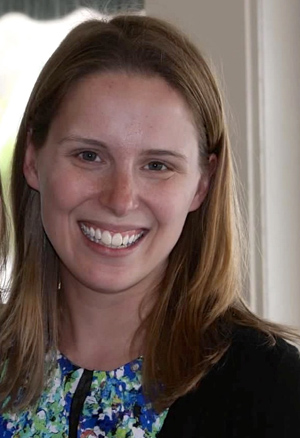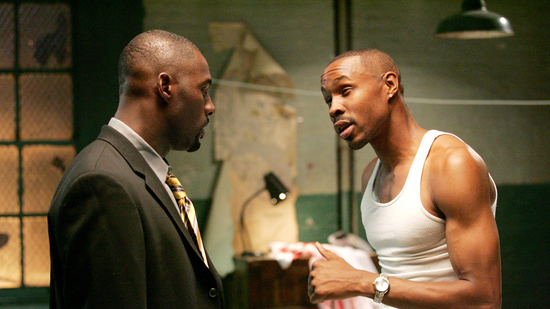Class by class, lecture by lecture, question asked by question answered, an education is built. This is one of a series of articles about visits to one class, on one day, in search of those building blocks at BU.
In this fall’s back-to-school guide, Boston.com named the BU political science course The Politics and Policy of HBO’s The Wire the “Coolest Class to Take” at BU. On a recent Tuesday afternoon, however, it takes a few minutes to see why.
Laptop keyboards clatter as the 100-plus students in a College of Arts & Sciences lecture hall note the difference between prospective and retrospective voting and between redistributive, allocational, and developmental approaches to resource distribution in local government.
Important? Yes. Cool? Not so much.
A hint of cool comes when coteachers Katie Einstein and David Glick, both CAS assistant professors of political science, reveal a sample “true or false, and explain” question from an upcoming exam: “On the show, the Barksdale organization manages to function as a bureaucracy even though it is full of unreliable workers who don’t respond to incentives.”
The “organization” isn’t a city department or even a political campaign. It sells heroin and cocaine in Baltimore’s housing projects. Fictional drug kingpin Avon Barksdale runs an army of street dealers on The Wire, a panoramic exploration of urban Baltimore, from the drug corners to the corridors of power, that ran on HBO from 2002 to 2008.
“Those are some of our favorite exam questions to construct,” says Einstein. “They combine complicated social science concepts with fun scenes or characters from The Wire.”
As for the Boston.com nod, she says, “It’s the first and probably last time either of us has been the ‘coolest’ anything, so it’s pretty exciting for both of us.”

Katie Einstein says the coteachers’ favorite exam questions “combine complicated social science concepts with fun scenes or characters” from the show. Photo courtesy of Einstein
Call it the binge-watch curriculum. Students are assigned several episodes of The Wire each week, along with readings that include R. Douglas Arnold and Nicholas Carnes’ “Holding Mayors Accountable: New York’s Executives from Koch to Bloomberg” (American Journal of Political Science, 2012) and Paul Peterson’s City Limits (University of Chicago Press, 1981). Narrative threads from the show illuminate the concepts in the readings.
Series creator David Simon, who is also responsible for Homicide: Life on the Street and Treme, is a former Baltimore Sun crime reporter, and he uses thinly veiled real-life Baltimore characters to detail the complex and often corrupt relationships between City Hall and the housing projects, cops and crooks, educators and politicians and the media.
“It’s an interesting way of teaching about public policy,” says political science major Lianne O’Reilly (CAS’18). “By seeing real-life examples expressed through the show, you gain a better understanding.”
Even a minor aspect of the show, say a dispute between gang leaders, can illustrate the importance of norms and unwritten rules in social systems. “I don’t think most people would say The Wire is a show about norms,” Glick says. “But there’s a great scene when Stringer Bell sends his guys to go after Omar on a Sunday morning, and there’s a whole to-do because Sunday is church day. Even though everyone’s in the business of killing each other without qualms, you don’t do it on a Sunday morning, and everyone knows this.”
Notable Boston officials have been guest speakers, including the late Boston mayor Thomas Menino (Hon.’01), director of BU’s Initiative on Cities. On November 19, Boston police commissioner William Evans is slated to speak and take questions.
The Wire won a Peabody Award and almost unanimous critical acclaim—but it never won an Emmy or even good Nielsen ratings. HBO ran 60 episodes of the show over five seasons. Simon and his cast and crew brought a stark gravity to characters such as Barksdale, troubled Detective Jimmy McNulty, and ambitious city councilor Tommy Carcetti.
For this day’s class, the students have watched well into season three, where politicians are jockeying for position in an upcoming mayoral election. Before the lecture begins, Glick projects a graphic showing a conversation between Carcetti and his mayoral campaign manager, Theresa D’Agostino.
D’Agostino: So, with crime as the issue, the great white father rides to the rescue. Against a black incumbent mayor, in a city that’s 65 percent black?
Carcetti: Black, white, green, people are pissed off.
D’Agostino: What makes you think this is doable?
Carcetti: One, I hear the mayor’s got problems in his base and with key supporters….And three, Tony Gray from the Fifth District comes pretty close to telling me he’s thinking about a run for mayor. That’d split the black vote.
“I’m really interested in urban politics, and more specifically, racial politics,” says Laura LaBrecque (CAS’18), another political science major. Learning from The Wire “puts things into more specific examples, in a perspective you might not think about.”
And, she says, it’s “super fun.”
Connor Lenahan (COM’17) says the class offers a new approach to teaching political science. “It essentially puts a pill that I would never want to take in a coating that I do,” he says. “I’m a film and TV guy, and The Wire is probably the best show I’ve ever seen.”

The Wire focused on the gritty realities of urban life, including the drug gang operated by Avon Barksdale (Wood Harris) (right) and his second-in-command, Stringer Bell (Idris Elba). Photo courtesy of HBO
Einstein and Glick, friends as well as collaborators, started talking about developing a class based on The Wire about four years ago. “Every person who studied urban politics watched it,” Einstein says. This is the third autumn they’ve taught the class.
“I think students are accustomed to watching TV at a really rapid clip now,” she says, “so telling them to watch seven episodes this week is not really that unusual.…And we can show YouTube clips in class.”
The Wire is one of several shows taught in college classrooms across the country, a practice made possible by Netflix, Amazon, and other watch-anywhere technology. It was also the subject of a sociology course at Metropolitan College a few years ago.
“I can’t imagine how the technology would have worked even when I was in college, which was not that long ago,” says Glick with a laugh. “Now students can watch it on their computers or their tablets or phones.”
Einstein watched The Wire during its original run on HBO when she was in college. Glick found it later, while looking for a new show to binge-watch on DVDs from the library.
“I think a lot of the other classes on The Wire are traditionally either history or sociology and link with urban and racial inequality,” Einstein says. “This is very much within political science, where I teach.”
But she has another connection: “My father teaches The Wire as a historian at the University of Wisconsin–Milwaukee,” she says. “It’s a traditional urban history class. But I think it was always in the back of my mind as something cool to do.”
Einstein and Glick plan to teach PO 313, The Politics of The Wire, again in fall 2016.















































Related Stories
Pardee Prof Wins Southeast Asian Politics Paper Prize
Menchik’s work part of forthcoming book on tolerance and world’s largest Islamic organizations
Why Some Politicians Shun Promotions
Big-city mayors are not interested in higher office, BU research finds
CAS Historian’s View of American Politics, circa 2016
This presidential election reflects changes beginning more than a century ago
Post Your Comment